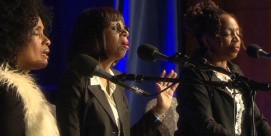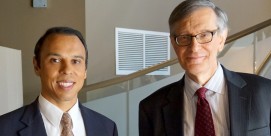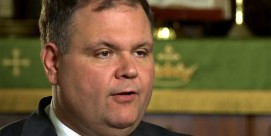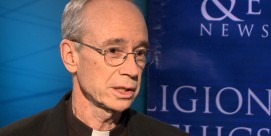Richard Wightman Fox: “A Memorable American Political Oration”
Whatever one thinks of his politics, one has to admit that Governor Romney’s Texas speech on “Faith in America,” like Senator Kennedy’s remarks to the Greater Houston Ministerial Association in September 1960, was expertly written and beautifully delivered. Both men rose to the occasion by reminding us of the hard-won American commitment to religious liberty. Both of them pulled off the delicate feat of downplaying their specific religious beliefs while declaring their loyalty to their church. Both said they would rather lose than give up their faith. (Kennedy brilliantly added that if he got beat because of being Catholic, the real loser would be the nation; Romney should have made the same point with the same understated passion.)
Speaking as committed men of faith, they could then claim, if they should become president, to represent all citizens of faith. Neither man worried about alienating the minority of non-religious voters. Kennedy, like Martin Luther King three years later in the “I Have a Dream” speech, spoke of America as a nation of Protestants, Catholics, and Jews; Romney bravely brought Muslims into the fold, explaining that as a Mormon he had something to learn from people of other religious traditions. He appreciated the “frequent prayer” practiced by Muslims, just as he liked the evangelical Christians’ sense of the “approachability” of God, the Lutherans’ “confident independence,” the Pentecostals’ “tenderness of spirit,” the “ceremony” of the Catholic Mass, and the “ancient traditions” of the Jews.
In that litany he very noticeably said nothing about what the rest of America could learn from his own Latter-day Saints. He came close to claiming devotion to family as a distinctive LDS virtue, but backed off, stressing that even his own family fell short of the “perfection” to which they aspired. But throughout the speech he argued implicitly that the Mormons’ commitment to religious freedom stood as a model for all. Has any presidential candidate ever before stated that as a man of faith he wished his church would learn from the traditions of others? (Non-candidate Mario Cuomo has said so many times, adding that encountering other religions permits one to rediscover forgotten features of one’s own tradition, as encountering Judaism led him to new appreciation of his Catholic faith.)
If anything, Romney surpassed Kennedy in the passion he conveyed while tracing the history of the battle for religious liberty, likening Brigham Young’s trek West in the 19th century to Anne Hutchinson’s and Roger Williams’s struggles in the 17th. Romney said nothing about his specifically Mormon beliefs, but everything he said about faith in America — his own and everyone else’s — was subtly and potently informed by his memory of the persecution experienced by his Mormon ancestors. The power of the speech reminds me of the power of Barack Obama’s at the Democratic convention in 2004: Obama’s vision of a multicultural America was rooted in his own biracial, binational past. I sense Romney’s speech will go down as a memorable American political oration regardless of his success as a candidate. He spoke eloquently of what it means to be an American whose ancestors fought for the freedom of religion guaranteed to them by the Bill of Rights, and to practice one’s faith in a religiously pluralistic society where everyone can gain by opening up to the spiritual insights of others.
Romney’s speech was twice as long as Kennedy’s (20 minutes to 10 minutes), but Kennedy stayed at the podium for 30 more minutes of questions from seven Protestant ministers, who were permitted to grill him with unlimited follow-ups. Kennedy shined in that format of quick-witted repartee, treating his questioners respectfully, almost deferentially, while still expressing himself forcefully. Romney took no questions. In the weeks and months to come, he will face some of the grilling to which Kennedy submitted right after his speech. Kennedy, by gaining the support of prominent Protestants in 1960 (Reinhold Niebuhr and John Bennett among them) probably saved Romney the trouble of having to reconcile the hierarchical structure of the LDS Church with American democratic values. And it should be easy enough for Romney to handle the narrow “Jesus” issue. He can keep repeating what he said in the speech: “I believe that Jesus Christ is the Son of God and the Savior of mankind,” then claim that he would rather leave the fine points to the theologians. It may be harder for him to explain what Latter-day Saints mean when they say that the 19th-century Book of Mormon counts as a revelation like the Old and New Testaments, or that all believers can aspire to being “gods.”
Finally, Romney’s speech shrewdly combined reaching out to Protestant evangelicals with an overture to the general religious population, liberals included, whom he will want to win over if he gets the Republican nomination. He went out of his way to distance himself from many Protestant Republicans by stating that “reason and religion are friends and allies.” In a general election campaign he would try to position himself right on that boundary line: welcoming religion into public life (as many Democrats nowadays, unlike Kennedy, are also eager to do) while asserting that rational judgment and scientific expertise are fully compatible with faith. But some questioner may complicate matters for him by asking, for example, how, given his dual embrace of reason and religion, he interprets his prophet Joseph Smith’s claim to have himself translated, from the hieroglyphics on gold plates he discovered on September 22, 1827, the Book of Mormon.
Richard Wightman Fox is the author of JESUS IN AMERICA: PERSONAL SAVIOR, CULTURAL HERO, NATIONAL OBSESSION (HarperCollins, 2004).







